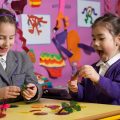A Summer Holiday Full of Fun & Learning
The summer holidays give your child a valuable break from the demands of the school year. While time to rest and play is essential, long weeks without learning can lead to children falling behind once school resumes. As a parent, balancing relaxation and keeping young minds engaged can be tricky.
With the right approach, summer can be fun and educational, offering your child a chance to grow without pressure.
Turning Time Off Into Time Well Spent
Instead of letting routines slide completely, consider gently structured days that mix play with learning. Many families find that enrolling in a language school or summer programme helps children stay mentally active without sacrificing their holiday spirit.
Providers like SKOLA offer enjoyable, well-balanced activities that support language development and personal growth. These settings differ from term-time classrooms, making learning more accessible and less formal. Children return to school with boosted confidence and fresh skills, rather than needing to relearn old ones.
Keeping Academic Progress Ticking Over
During the break, your child may forget key learning without regular use of it, especially when it comes to languages. You give them a head start before September by building in light, daily exposure to words, phrases, or simple reading in a second language.
Language games, storytelling, and casual chats in another language help your child retain vocabulary. These activities feel playful and relaxed, but still support educational progress. A well-run summer school for kids will approach learning through creativity and interaction, offering an ideal mix of guidance and independence.
Why Structured Activities Still Matter
You might worry about overloading your child during the holidays, but a small amount of focused activity makes a difference. A few hours a day can offer educational benefits while leaving plenty of time to unwind.
Choose activities that don’t resemble regular lessons. Games, cultural crafts, and themed workshops all keep your child engaged. Cooking using recipes written in another language or exploring board games based on vocabulary are great ways to blend fun with learning. These experiences help language learning happen naturally.
Language Learning Beyond Words

Adding another language to your child’s toolkit does more than boost their speaking ability. It strengthens how they think, solve problems, and approach new tasks. Switching between languages enhances mental flexibility and supports other areas of learning, too.
Children who learn in multilingual settings often become more aware of different cultures and are open to new perspectives. A good language school will naturally build this into its programmes through music, food, games, and stories from various countries. This cultural insight helps shape a broader worldview and emotional understanding.
Adapting Language Learning to Your Child’s Age
Younger children absorb language through play and repetition. They’re more likely to mimic sounds correctly and enjoy learning through singing, drawing, or imaginative games. At this stage, it is best to avoid direct grammar teaching and focus on immersion.
Older children may cope better with a more structured setting. They often enjoy combining practical tasks with short grammar or reading sessions. With gentle encouragement, they can build confidence in speaking and writing independently. Recognising these age-related differences makes your summer plans more effective and enjoyable for everyone.
Weaving Language Learning Into Daily Life
You don’t need a formal classroom to support your child’s progress. Try creating small habits at home. Label household objects in another language or listen to foreign-language music during car journeys. Short cartoon clips with subtitles can also help reinforce new phrases.
Arts and crafts activities, where your child follows instructions in a second language, make the experience memorable. For example, they could create picture dictionaries, short stories, or role-play scenes using puppets. These small efforts encourage language use in a stress-free, everyday setting.
What to Look for in a Summer Programme
Not all summer courses offer the same experience. Look for small group sizes and qualified staff with relevant experience in teaching young learners. A good balance between structured learning and social activities helps your child stay motivated throughout the day.
Check whether the course is accredited and ask about safety procedures, especially if you’re exploring a summer school for kids. Some organisations offer sample schedules and welcome questions about their approach. Choose one that shows sensitivity to emotional needs and is happy to adapt for different age groups or personalities.
A well-rounded language school will know how to keep lessons fun without losing focus. Children learn best when relaxed and supported, and when learning is embedded into play and exploration.
A Balanced Approach for Lasting Benefits
You don’t have to choose between fun and learning. A well-planned summer can give your child the break they need while still supporting their development. Whether through informal home activities or enrolling in a programme that offers more structure, there are plenty of ways to help your child grow during the holidays.
With gentle routines, creative tasks and engaging environments, the summer can become a season of progress rather than pause.





